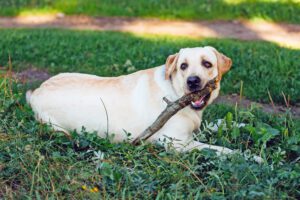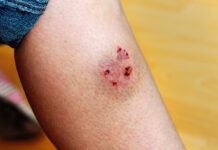Every dog – whether a large working dog or a small pet – seems to like to chew on things, although we don’t yet fully understand why.
A study published in Applied Animal Behaviour Science in 2021 determined that chewing was not motivated by play or activities, but 94% of households provide their dogs with a chew object.
In 2020, a study published in Frontiers in Psychology determined that chewing sticks was similar to the use of a tool. In other words, “If chewing is caused by, at least in some cases, a pain in the teeth and some inclination to chew sticks given that pain, or occurs after consuming food that is likely to get stuck in their teeth, this direct and immediate function of the behavior should qualify as tool use.” Researchers hypothesized that a dog probably doesn’t understand the difference between chewing on a wood stick from the woods and wooden furniture. Maybe dental chews would help here.
What Dog Experts Think
Since dogs aren’t talking and scientists can’t find a solid reason for why dogs chew on wood and other things, we looked to dog experts for some consensus. Here’s what we found
Wood likely offers a natural smell with a satisfying hardness that the dog can chew and pull apart. It’s just nature’s favorite toy. Note: Remember, wood chewing is fraught with potential veterinary emergencies, from splinters in the mouth to pieces lodged in the gastrointestinal tract and more.
Puppies need to chew, as it helps soothe sore gums, just as it does a baby who is teething.
For adult dogs, boredom appears to play a part in chewing. You leave your dog every day while you go to work or school. He probably sleeps for most of that time, but eventually he gets tired of looking at four walls and through the window at a pesky squirrel. So, one day he gnaws on a nearby table leg – and it’s fun and handy.
Anxiety can cause a dog to chew. Take that same dog but change his temperament to one that is anxious about being alone, who hears noises and voices everywhere. To calm himself, he chews up a chair from the kitchen table.
The third reason is somewhat supported by research, at least the tool idea. It’s oral health. Dogs may have an instinct to exercise their jaws and clean their teeth- or just a drive to make them feel better. Sticks and furniture are hard and rough, so they’re good for that.
What Can You Do?
Buy him safe chew toys! The type of chew toys you get depends on your dog. A Chihuahua or Miniature Poodle won’t want anything big or too hard, but a strong chewer like a Doberman or German Shepherd need big and strong toys. Kong and Planet Dog are just two companies approved by the Veterinary Oral Health Council that make toys that will probably last your dog’s lifetime.
More exercise or activity will help your dog – and you. Take him on longer walks, especially before you go to work. Make more play time. Take him places to stimulate his brain.
Deterrents
To stop compulsive or confirmed chewing right away, you can mix apple cider vinegar with water and then spray or paint it on the things you don’t want him to eat. It has a sour taste that dogs don’t like, and it won’t hurt him.
But the long-lasting effect of behavior modification – with toys and exercise – is what you really need to discourage your dog’s craving for furniture.






